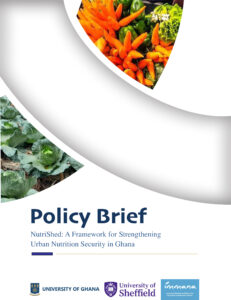NutriShed Policy Brief: A New Tool for Nutrition-Sensitive Urban Planning in Ghana
About the Policy Brief
The NutriShed policy brief titled “NutriShed: A Framework for Strengthening Urban Nutrition Security in Ghana.” summarizes insights from a two-year project that tested a five-step approach for tracking how nutrients — not just food commodities — flow from production zones into cities like Takoradi and Asesewa. It highlights that urban food systems in Ghana face multiple challenges: limited cold storage, poor transport networks, and seasonal disruptions that reduce the availability and affordability of nutrient-rich foods.
The findings reveal significant micronutrient gaps among women and children, especially in iron, calcium, folate, and vitamin B12 intake. These deficiencies are strongly linked to weaknesses in food distribution systems rather than mere production shortfalls.
The policy brief was developed under the NutriShed Project, led by Professor Richmond Aryeetey of the University of Ghana School of Public Health in collaboration with the University of Sheffield and local research partners, this policy brief offers a groundbreaking framework for diagnosing and planning urban nutrition security in Ghana.
Key Recommendations
The brief proposes six key actions to strengthen nutrition security:
-
Invest in food system infrastructure – cold storage, processing, and road networks.
-
Support local production of nutrient-rich foods through urban and school gardening.
-
Integrate spatial nutrition data into city-level planning and monitoring.
-
Promote healthy eating through sustained community-based nutrition education.
-
Foster multi-sector collaboration between health, agriculture, and city planners.
-
Build local capacity to use spatial tools for food system and nutrition planning.
To access the policy brief click here.





